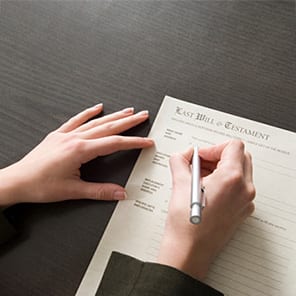There is more to writing a will, particularly when special needs children are involved, than doing a deal with your best friend about the care of your children, signing some documents and crossing your fingers in the hope that you’ll never need them.
According to legal experts, all parents should consider writing a will, but for those with special needs children, it’s even more important to take extra steps to secure kids’ futures.
The decisions involved in writing a will can be complicated if your special needs child faces the prospect of being unable to care for herself after you have passed away.
Experts say that simply leaving money, or the balance of an estate, to an intellectually disabled child may not be the best option to provide them with adequate life-long financial support. It fact, it could disadvantage your child and their new carer if it disqualifies them from receiving financial support from the Government.
It’s worth talking to your solicitor about the different kinds of trusts that can be established to ensure the long-term care of your child with special needs. This way, the provisions established in a parent’s or grandparent’s will are better structured to meet your child’s on-going requirements.
Whether your child has special needs or not, it makes sense to keep your wills in a safe place where they are readily accessible in the event they are needed.
For parents of children with special needs, experts also suggest that you be specific about information that future caregivers would need so that they can carry on if you are gone.
One way to ensure that this information is easily found is to create a special folder that is updated regularly. This ‘Future Care’ folder should be updated regularly to reflect changes in family circumstances, the evolving needs or desires of your child, and other issues that may assist your child’s future caregivers in carrying out their duties.
10 Things to put in your child’s ‘Future Care’ folder
1. Important legal papers for your child
For example, birth certificates, copies of Medicare, Centrelink and health insurance cards
2. A Letter of Intent
This is a nonbinding document that you should update at least once per year. It gives vital information about a person with a disability to future caregivers. It can include such things as your child’s sleeping preferences, eating habits and other important aspects of your child’s daily routine. While these items may be second nature to you, it is important not to take them for granted. After all, in many cases the person who will assume the care of your child will probably never have walked in a single day in your shoes.
3. Written instructions outlining your wishes regarding final arrangements.
Do you wish to be buried or cremated? What kind of funeral service do you want? Your child will not know the answers to these questions, so it’s best to have them written down somewhere.
4. Your own advance health care and financial directives
These include enduring powers of attorney, living wills and health care proxies. By having these documents in a folder that can be accessed when needed, you can save your family the heartache and expense of a guardianship proceeding should you become incapacitated. This is important for any family, but if you have a special needs child it is crucial; the last thing you want is confusion over your own wishes to distract from the needs of your child
5. Trust fund details
If you have established a Special Disability Trust or Protective Trust for your child, make sure that copies of the paperwork are in the folder. You should also provide information about where the original documents are kept, such as at your solicitor’s office or with a Trustee.
6. A list of major assets
Make sure information about bank accounts, investment portfolios, life insurance policies and the names of your solicitor, brokers, insurance agents and investment advisors are included.
7. Support services
A list of advocacy organisations, government agencies and health services that may be helpful for your child’s future will be important for your child’s carer. Also, write down any personal reflections or thoughts you may have about these organisations and the people there who know your child.
8. List of government benefits your child may receive
Your child’s future carer will need to know what support your child is entitled to. It helps to also include copies of completed application forms. Since your child’s new carer may be unfamiliar with complex bureaucratic systems, this will help them the next time they apply for benefits on behalf of your child.
9. School information
Details of your child’s school, teacher and copies of class contact lists will help your child’s new carer to keep daily routines stable. If your child uses special transport services to get to and from school, add details of these too.
10. Other miscellaneous papers
Collect documents that might help your child’s future carer organise your child’s affairs, such as tax returns filed for your child, information about housing options and photographs of the family.
The writing of a will, especially when you are the parent of a child with special needs, can often seem overwhelming. But it’s worth doing, because you’ll never know when your child’s future security will depend on it.
This article was written by Sonja Walker, a qualified teacher and busy mum. Sonja leads a team of highly experienced, specialist teachers and children’s health professionals at Kids First Children’s Services a unique integrated children’s education and health centre in Sydney’s Northern Beaches.





















9:41 am
9:36 pm
1:40 pm
3:24 pm
9:36 pm
9:57 pm
12:10 pm
9:55 pm
9:48 am
11:01 pm
10:52 am
9:07 am
12:49 pm
7:55 pm
11:53 am
11:48 pm
4:42 pm
5:51 pm
9:01 pm
7:48 pm
- 1
- 2
- …
- 6
- »
Post a commentTo post a review/comment please join us or login so we can allocate your points.